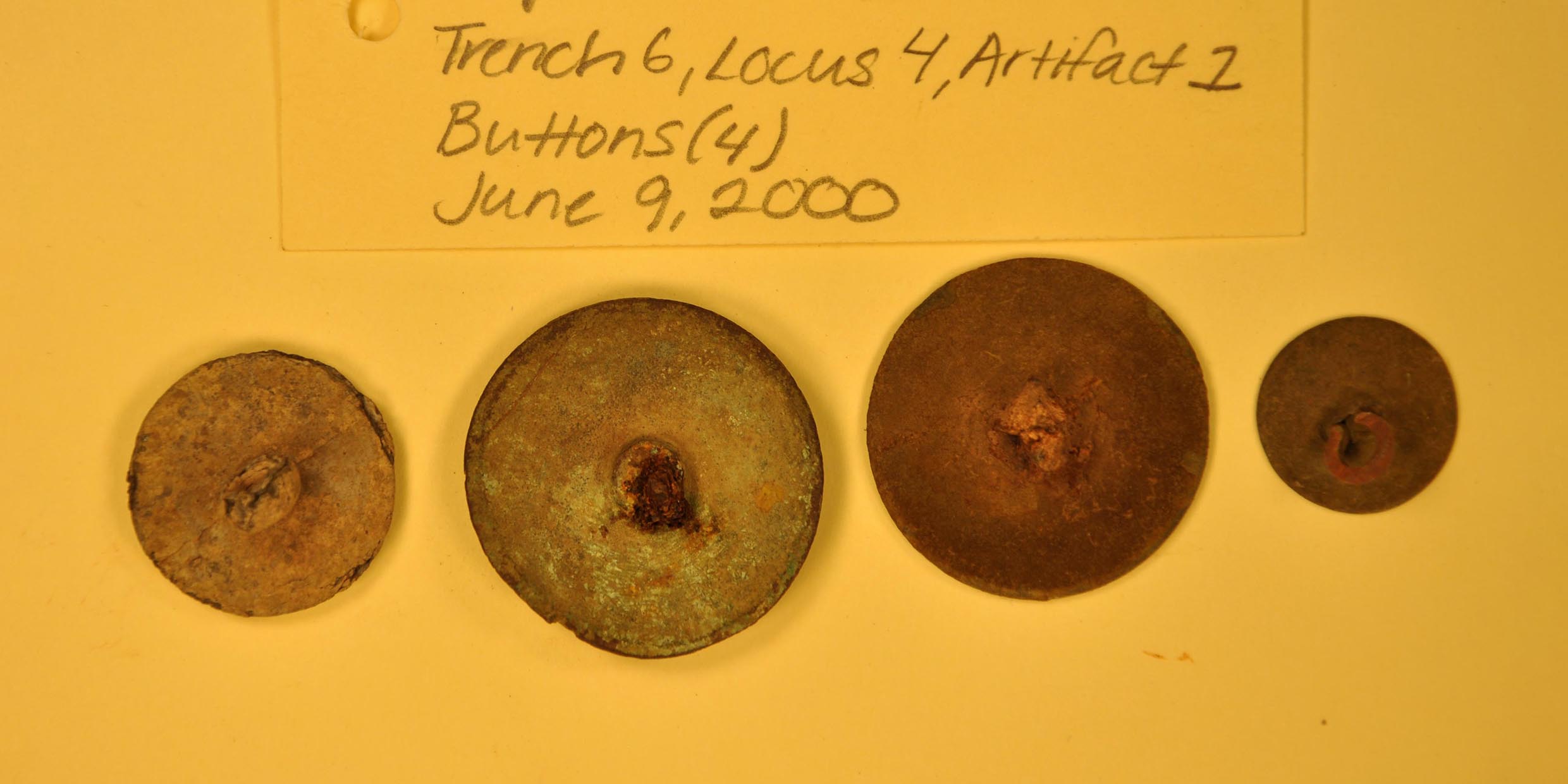Originally published 21 May 2006
Yesterday it was my pleasure (with the able assistance of local historian Ed Hands) to lead a group of fellow citizens from the Easton Historical Society deep into the woods of the Stonehill College campus, to a place where no trail goes — the late-18th-century foundation of the Daily homestead.
The place is heavily wooded now, but once it was the home of early settlers of our town. All that remains is a cellar hole, a door sill, fragments of a chimney, a filled-in well, and collapsed stone walls.
My colleague at the college, Erika S., an archeologist, recently spent two summers with student interns excavating the site, mainly to teach them the methodologies of her discipline, but also to add to the history of our campus.
On my visit yesterday, I took along some of the artifacts she and her students collected. A coin with the image of George II. A musket ball. Broken clay pipes. Metal buttons. A pewter fork with a bone handle. Several spoons. Fragments of glass bottles and decorated crockery. Some items were of native manufacture, some imported. We passed these objects around as we sat there in the sun-dappled woods on a spring morning and I read aloud Maxine Kumin’s poem, “A Cellar Hole at Joppa,” a bit of which follows:
Bearing in mind the way the patriarch, his wife, his livestock, the branches of his tree---nine sons, eight sturdy, one clubfooted, and a rock- candy daughter---may go down, like the chimney, all at once in a year of drought or winterkill, there come from digging deep a hard love in the boneyard. The trash heap underneath the groundsill gives up at last a piece of bowl. A pot the rust has eaten down to crumbs of blood flakes against our thumbs. Then a blue bottle, ink crusted but whole.
o my dear skeleton what is to be preserved and why? is there a word to keep you by?
Kumin’s Joppa is in New Hampshire, but our cellar hole was similar — the door sill at the south, the chimney facing the prevailing wind, Each of the items in my bag of artifacts was a memento of lives lived hard and simple — loves, labors, joys, troubles. Such simple things — pots, bowls, utensils for eating, the pleasure of tobacco at an evening’s rest, buttons to hold a jacket closed against the winter chill — hardly changed since neolithic times.
What, I wondered, would archeologists two centuries from now make of the detritus of our own lives? We toss out in the trash in a week more material possessions than the Dailys accumulated in a lifetime. If my house collapsed into its cellar hole, it would take down with it enough material goods to supply a whole township of Dailys.
An article in the Wall Street Journal a few weeks ago described the trend to ever bigger household appliances. The article was illustrated with a photograph of a GE refrigerator that measures six feet across, holds 41 cubic feet of food, and costs $13,999. A builder is quoted as saying of these new appliances for McMansion America: “I’m getting the feeling there’s no such thing as too big.”
What would I wish to be my material legacy for future archeologists?
Books, certainly, many of them perhaps newer editions of the same books a contemporary of John Daily might have owned. Music. What a miracle that I can carry in my iPod music of Daily’s own era — which in his day only the privileged class might hear — along with music of my own time. My Mac laptop, too, which for better or worse has attached itself firmly to my life. Crockery, of course, much of it made by potter friends. Art, again the work of artist friends and acquaintances. Family photographs. In the end, not much. Not much more than the Dailys left behind.
Which is not to say I don’t appreciate the washer, dryer, refrigerator, hot water heater, oil-burning furnace, electric cook stove, automobile, and other accouterments of 21st-century civilization. I would not want to forego antibiotics, the internet, my prescription bifocal glasses, cheap decent wine, and that nifty mechanical pencil I use to do the daily New York Times crossword puzzle.
Sitting in the sun-dappled woods at the edge of the Daily cellar hole, passing around the mementos of vanished lives, was a good time to take stock of our own lives, of searching for that balance between comfort and toil, too much and too little, self-indulgence and care of the planet. A few saints among us, blessed with plenty, give it all up to help those who have little. But most of us in the developed world hold close more of technology’s bounty than is good for us.
o my dear skeleton what is to be preserved and why?



